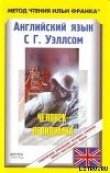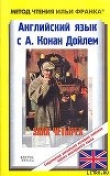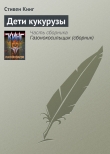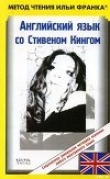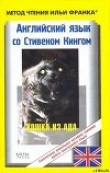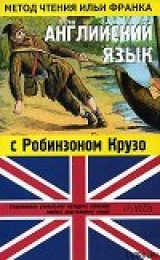
Текст книги "Английский язык с Робинзоном Крузо (в пересказе для детей)"
Автор книги: Илья Франк
Соавторы: James Baldwin
Жанры:
Языкознание
,сообщить о нарушении
Текущая страница: 4 (всего у книги 21 страниц) [доступный отрывок для чтения: 8 страниц]
I LEARN THAT I AM ON AN ISLAND
(я узнаю, что я на острове)
THE sun was still two hours high (солнце показывало еще только два часа). I was very tired after my day's work (я был очень усталым после дневной работы), but I could not rest (но не мог отдыхать). I wanted to know what sort of place I was in (я хотел знать, в какого рода месте я был). I wondered whether I was on an island or on a continent (я задавался вопросом, был ли я на острове или на материке).

About half a mile from the shore there was a large hill (примерно в половине мили от берега был большой холм). It was steep and high (он был крутой и высокий) and seemed to overlook all the country (и, казалось, обозревает всю местность = возвышается над всей местностью).
I thought that if I could get to the top of that hill (я подумал, что если бы я мог добраться до вершины того холма) I might see what kind of country I was in (я смог бы увидеть, в какой местности я был: «в какого рода местности…»).
So I put one of the pistols in my belt (поэтому я сунул один из пистолетов за ремень), and one of the guns on my shoulder (а одно из ружей /положил/ на плечо; to put – помещать, класть). I also hung the powder-horn (я также повесил пороховницу, сделанную из рога; powder – порошок; порох; horn – рог) on my neck (на шею) and put a handful of small shot in my pocket (и положил горсть маленькой дроби в карман).
Thus armed (так вооруженный), I set out for the big hill (я отправился к большому холму).
There were but a few shrubs or trees in my way (на моем пути было только несколько кустов или деревьев), and the walking was easy (и ходьба была легкой = и путь был нетрудным). In less than a quarter of an hour I was at my journey's end (менее чем через четверть часа я закончил поход: «я был при конце моего путешествия»).
The sides of the hill were not rough (склоны холма были не неровными = довольно гладкими; rough – грубый; жесткий; неровный), but they were quite steep (но они были довольно крутыми).
Soon I was at the very top (вскоре я был на самой вершине). What a grand lookout it was (какое потрясающее зрелище: «обзор, панорама» это было)!
North, south, east, west (север, юг, восток, запад), the land and the sea were spread out before me (земля и море были распростерты передо мной).
The sea did I say (я сказал «море»)?
Yes, I was on an island, and the sea was all around (да, я был на острове, и море было везде вокруг = со всех сторон).
No other land was in sight (не было другой земли/суши в пределах видимости) except two small islands and some great rocks (за исключением двух маленьких островов и нескольких больших скал/рифов) that lifted themselves out of the water (которые поднимались: «поднимали себя» из воды).
I saw that my island was not very large (я увидел, что мой остров был не очень большим). Perhaps it was ten miles broad (возможно, он был десять миль шириной); perhaps it was twenty (возможно, это было двадцать /миль/). I had no good idea of distances (я не имел четкого представления о расстояниях).
There was no house nor sign of life anywhere (не было ни дома, ни признака жизни нигде; sign – знак, признак). There might be wild beasts in the woods (должно быть, в лесу были дикие звери: «могли быть дикие звери в лесу»); but I was sure that no men lived there (но я был уверен, что никакие люди там не жили).
The thought of being alone (мысль о том, что я был один: «мысль бытия одним») on a desert island (на пустынном острове) made me feel very sad (заставила меня почувствовать себя очень грустно).
I should have been glad at that moment (я должен был бы быть рад = должно быть, был бы рад в то мгновение) to see even the face of a savage (увидеть даже лицо дикаря).
But I dared not stay long on the hilltop (но я не решился оставаться долго на вершине холма). I hurried to get back to my raft (я поспешил добраться обратно до плота) before the sun should go down (пока не зашло солнце).
At the foot of the hill I saw a great bird sitting in a tree (у подножия холма я увидел большую птицу, сидящую на дереве). I thought it to be some kind of a hawk (я подумал, что это какой-то вид ястреба) and shot it (и подстрелил ее; to shoot – стрелять).
The sound of the gun echoed strangely among the rocks and trees (звук отдался cтранным эхом среди скал и деревьев). Never before had such a sound been heard there (никогда раньше такой звук не слышался: «не был слышим» там).
I picked up the bird (я подобрал птицу).
It was no hawk (это был не ястреб). It had no sharp claws nor hooked beak (у нее не было ни острых когтей, ни клюва крючком). Its flesh was unfit to eat (ее мясо было непригодным для еды; flesh – плоть; мясо), and I threw it away (и выбросил ее; to throw – бросать; to throw away – выбрасывать; away – прочь).
The sun had set and it was almost dark (солнце зашло, и было почти темно) when I got back to the inlet (когда я добрался обратно до бухты; inlet – узкий морской залив; фиорд, небольшая бухта) where my raft was lying (где лежал мой плот). I did not know where to go for the night (я не знал, куда пойти на ночь), nor where to find a resting place (ни где найти место для отдыха/привала; to rest – отдыхать; покоиться).
But the day being gone (но, так как день прошел), there was no time for thinking (не было времени на раздумья).
I made a kind of hut (я сделал = соорудил подобие лачуги; kind – сорт, разновидность; разряд; вид, класс, род) with the chests (из ящиков) and the loose boards from the raft (и отдельных/разрозненных досок с плота; loose – свободный; непривязанный, неприкрепленный). Then I crept inside (влез внутрь; to creep – ползти; пробираться) and lay down to rest (и лег отдохнуть; to lie – лежать; to lie down – ложиться; to rest – отдыхать; покоиться).
For a little while (в течение небольшого времени; while – промежуток времени) I listened to every sound (я прислушивался к каждому звуку). At length I fell asleep (наконец я заснул; to fall asleep – засыпать) and knew nothing more until broad daylight the next morning (и не узнал ничего больше до яркого дневного света следующим утром = забылся сном и проснулся, когда было уже совсем светло).
hour [ˈauǝ], island [ˈaɪlǝnd], continent [ˈkɔntɪnǝnt], half [hɑ:f], overlook [ˌǝuvǝˈluk], country [ˈkʌntrɪ], thus [ðʌs], journey [ˈʤǝ:nɪ], rough [rʌf], spread [spred], distance [ˈdɪstǝns], sign [ˈsaɪn], live [lɪv], hawk [hɔ:k], heard [hǝ:d], hook [huk], beak [bi:k], threw [Ɵru:], listen [ˈlɪs(ǝ)n], asleep [ǝˈsli:p]
I LEARN THAT I AM ON AN ISLAND
THE sun was still two hours high. I was very tired after my day's work, but I could not rest. I wanted to know what sort of place I was in. I wondered whether I was on an island or on a continent.
About half a mile from the shore there was a large hill. It was steep and high and seemed to overlook all the country.
I thought that if I could get to the top of that hill I might see what kind of country I was in.
So I put one of the pistols in my belt, and one of the guns on my shoulder. I also hung the powder-horn from my neck and put a handful of small shot in my pocket.
Thus armed, I set out for the big hill.
There were but a few shrubs or trees in my way, and the walking was easy. In less than a quarter of an hour I was at my journey's end.
The sides of the hill were not rough, but they were quite steep.
Soon I was at the very top. What a grand lookout it was!
North, south, east, west, the land and the sea were spread out before me.
The sea did I say?
Yes, I was on an island, and the sea was all around.
No other land was in sight except two small islands and some great rocks that lifted themselves out of the water.
I saw that my island was not very large. Perhaps it was ten miles broad; perhaps it was twenty. I had no good idea of distances.
There was no house nor sign of life anywhere. There might be wild beasts in the woods; but I was sure that no men lived there.
The thought of being alone on a desert island made me feel very sad.
I should have been glad at that moment to see even the face of a savage.
But I dared not stay long on the hilltop. I hurried to get back to my raft before the sun should go down.
At the foot of the hill I saw a great bird sitting in a tree. I thought it to be some kind of a hawk and shot it.
The sound of the gun echoed strangely among the rocks and trees. Never before had such a sound been heard there.
I picked up the bird.
It was no hawk. It had no sharp claws nor hooked beak. Its flesh was unfit to eat, and I threw it away.
The sun had set and it was almost dark when I got back to the inlet where my raft was lying. I did not know where to go for the night, nor where to find a resting place.
But the day being gone, there was no time for thinking.
I made a kind of hut with the chests and the loose boards from the raft. Then I crept inside and lay down to rest.
For a little while I listened to every sound. At length I fell asleep and knew nothing more until broad daylight the next morning.
I HAVE A STRANGE VISITOR
(я принимаю странного посетителя)
THE next morning, when the tide was at its lowest (на следующее утро, когда вода была на самом низком уровне: «при своем самом низком»; tide – прилив и отлив; поток) I swam out to the ship again (я вновь поплыл к кораблю).

There were still many things on board (на борту было много вещей) of it that might be useful to me in my island home (которые могли бы быть полезны мне в моем островном доме; use – польза). I wished to save all that I could (я желал хотел сохранить все, что мог).
I climbed up the ship's side (я взобрался по боку корабля вверх) just as I had done the day before (точно так же, как я сделал днем ранее).
Before looking for anything (прежде чем искать что-либо) I made another raft (я соорудил другой плот), just like the first one (точно такой же, как первый), but smaller (но меньше). It was not so easy to make (это было не столь легко сделать), for I had used up all the best planks (так как я уже использовал все лучшие доски). It was neither so large nor so strong as the first raft (он не был ни таким большим, ни таким крепким, как первый).
In the carpenter's shop (в комнате плотника; shop – лавка, магазин; цех; мастерская) I found three bags of nails and a grindstone (я обнаружил три ящика гвоздей и точильный камень; to grind – молоть, перемалывать; растирать /в порошок/; толочь; grindstone – точильный камень; жернов). I found also a box full of little hatchets (я нашел также коробку, полную маленьких топориков) and a small barrel of musket balls (и маленький бочонок мушкетных пуль).
In the captain's room I found six or seven guns (в комнате капитана я обнаружил шесть или семь ружей), which I had overlooked before (которые я проглядел /не увидел/ ранее), and another keg of powder (и еще один бочонок пороха; another – еще один /такой же/; другой).
All these things I loaded with much care upon my raft (все эти вещи я погрузил с большой заботой на мой плот).
Then I gathered up as many clothes as I could find (затем я собрал так много одежды, как мог найти); also a spare sail (а также запасной парус), a hammock (гамак), and some bedding (и некоторые постельные принадлежности).
The raft was now quite full (плот был теперь довольно полным). The things were not heavy (вещи были не тяжелыми), but they made a large pile (но они составляли большую груду = из них вышла большая груда).
When the tide turned for the shore (когда поток повернулся к берегу = когда начался прилив; tide – прилив и отлив), I cut loose (я отрезал /бечеву/) and was soon floating homeward (и вскоре плыл: «был плывущим» к дому; homeward – /по направлению/ к дому).
I had found a good oar in the ship (на корабле я нашел хорошее весло). This I used as a paddle (я использовал его как «байдарочное» весло; paddle – плавник; байдарочное весло), and I had no trouble in guiding the raft (и не имел трудности в направлении = без труда направил плот; to guide – вести, направлять) to the right landing place (к правильному месту высадки).
I looked to see if the goods were safe which I brought over the day before (я посмотрел, были ли вещи сохранными, которые я принес днем ранее).
There, on one of my chests (там, на одном из моих ящиков), I saw a strange animal sitting (я увидел странное животное сидящее = сидело странное животное). She looked like a wild cat (оно выглядело, как дикая кошка).
As I went toward her (когда я пошел к ней), she jumped down (она прыгнула вниз) and ran a little way (и немного отбежала: «пробежала маленький путь»; to run – бежать). Then she stood still (затем она остановилась; to stand – стоять; to stand still – стоять на месте; still – неподвижный).
I followed (я последовал /за ней/). She stood very firm (она стояла очень неподвижно) and looked in my face (и смотрела мне в лицо: «в мое лицо»). She looked as though she had a mind to get acquainted (она смотрела так, как если бы имела намерение познакомиться; to get acquainted – знакомиться: «становиться знакомым»).
I pointed my gun at her (я нацелил на нее мое ружье), and shouted (и крикнул). But she did not care for that (но она не обеспокоилась/не обратила внимания).
I had a bit of biscuit in my pocket (в моем кармане был кусок печенья). This I now tossed toward her (я бросил его ей: «в направлении ее»). "Take this and begone (бери это и уходи)," I shouted.
It rolled quite close to her nose (оно подкатилось довольно близко к ее носу). She smell of it and ate it (она понюхала его и съела; to eat – есть). Then she looked up for more (затем она подняла взгляд, ожидая еще /куска/: «взглянула вверх для большего»).
"Thank you, I have no more to give you (спасибо, я не имею = у меня нет больше дать тебе)," I said.
Whether she understood me (поняла ли она меня; to understand – понимать), I do not know (я не знаю). But, with that (но на этом: «с этим»), she turned and marched away (она повернулась и удалилась; to маршировать; идти, вышагивать /демонстративно, обиженно, нервно, решительно и т. п./; away – прочь).
I now set to work (и вот я приступил к работе) to get my second cargo on shore (чтобы доставить мой второй груз на берег). It was no easy task (это было нелегкой задачей), and I had to make many trips to and from the raft (и мне пришлось проделать много путешествий к плоту и от плота).
When everything was safely landed (когда все было успешно сгружено /на землю/; safely – в сохранности; безопасно; благополучно), I made me a little tent with the sail and some poles that I cut (я сделал навес из паруса и нескольких колышков, которые я срезал; to cut – резать).
Then I put everything into the tent that needed to be kept dry (но я положил все под навес, что требовало быть хранимым = что нужно было хранить в сухости). The empty boxes, I piled outside (пустые коробки я сложил снаружи; pile – куча, груда; to pile – складывать, сваливать в кучу). They made a kind of wall around the tent (они образовали нечто вроде стены вокруг навеса), like the wall of a fort (подобную стене крепости).
"This will keep the wild beasts out (это удержит диких зверей снаружи = это предохранит от диких зверей)," I said.
By this time the day was nearly done (к этому времени день почти закончился). I spread one of the beds on the ground (я расстелил одну из постелей на земле). I laid two loaded pistols near its head (я положил два заряженных пистолета около ее изголовья), and one of the guns by one side of it (и одно из ружей возле нее/сбоку от нее). Then I crept in (затем я заполз/залез внутрь; to creep – ползать; пробираться) and was soon fast asleep (и скоро крепко заснул: «и был вскоре крепко спящим»).
useful [ˈju:sful], another [ǝˈnʌðǝ], grind [ˈɡraɪnd], barrel [ˈbær(ǝ)l], musket [ˈmʌskɪt], ball [bɔ:l], gather [ˈɡæðǝ], clothes [ˈklǝuðz], hammock [ˈhæmǝk], homeward [ˈhǝumwǝd], brought [brɔ:t], mind [ˈmaɪnd], acquainted [ǝˈkweɪntɪd], second [ˈsek(ǝ)nd], cargo [ˈkɑ:ɡǝu], task [tɑ:sk], put [put], wall [wɔ:l]
I HAVE A STRANGE VISITOR
THE next morning, when the tide was at its lowest I swam out to the ship again.
There were still many things on board of it that might be useful to me in my island home. I wished to save all that I could.
I climbed up the ship's side just as I had done the day before.
Before looking for anything I made another raft, just like the first one, but smaller. It was not so easy to make, for I had used up all the best planks. It was neither so large nor so strong as the first raft.
In the carpenter's shop I found three bags of nails and a grindstone. I found also a box full of little hatchets and a small barrel of musket balls.
In the captain's room I found six or seven guns, which I had overlooked before, and another keg of powder.
All these things I loaded with much care upon my raft.
Then I gathered up as many clothes as I could find; also a spare sail, a hammock, and some bedding.
The raft was now quite full. The things were not heavy, but they made a large pile.
When the tide turned for the shore, I cut loose and was soon floating homeward.
I had found a good oar in the ship. This I used as a paddle, and I had no trouble in guiding the raft to the right landing place.
I looked to see if the goods were safe which I brought over the day before.
There, on one of my chests, I saw a strange animal sitting. She looked like a wild cat.
As I went toward her, she jumped down and ran a little way. Then she stood still.
I followed. She stood very firm and looked in my face. She looked as though she had a mind to get acquainted.
I pointed my gun at her, and shouted. But she did not care for that.
I had a bit of biscuit in my pocket. This I now tossed toward her. "Take this and begone," I shouted.
It rolled quite close to her nose. She smell of it and ate it. Then she looked up for more.
"Thank you, I have no more to give you," I said.
Whether she understood me, I do not know. But, with that, she turned and marched away.
I now set to work to get my second cargo on shore. It was no easy task, and I had to make many trips to and from the raft.
When everything was safely landed, I made me a little tent with the sail and some poles that I cut.
Then I put everything into the tent that needed to be kept dry. The empty boxes, I piled outside. They made a kind of wall around the tent, like the wall of a fort.
"This will keep the wild beasts out," I said.
By this time the day was nearly done. I spread one of the beds on the ground. I laid two loaded pistols near its head, and one of the guns by one side of it. Then I crept in and was soon fast asleep.
I FIND A GREAT STORE OF THINGS
(я нахожу большой склад вещей)
THE next day I went to the ship again (на следующий день я вновь пошел к кораблю). This I kept up for more than a week (это я продолжал делать более недели: «больше, чем неделю»; to keep up – поддерживать; соблюдать, придерживаться).

Every day I brought a load of things to the shore (каждый день я привозил груз вещей на берег; to bring – приносить; привозить).
At last there was nothing left (в конце концов не было ничего оставшегося: «не было ничего оставлено»; to leave – оставлять) that one pair of hands could lift (что могла поднять пара рук). But I do believe that if the fine days had held out (я действительно верю, что, если бы хорошие дни сохранились), I would have brought away the whole ship (я бы вынес весь корабль).
You ask how I would have done that (вы спрашиваете, как я бы сделал это)? I would have cut it into pieces and brought one piece at a time (я бы разрезал его на части и приносил бы одну часть за раз).
The last thing that I found was a secret drawer in the cabin (последней вещью, которую я обнаружил, был секретный /выдвижной/ ящик в каюте; drawer – /выдвижной/ ящик /стола, комода/; to draw – тащить, тянуть). In that drawer there was some money (в ящике было какое-то количество денег).
A part of this money was in gold pieces (часть этих денег была в золотых слитках)—"pieces of eight," we called them (мы называли их песо: «кусками /из/ восьми»; piece of eight – старинное испанское песо, равнявшееся восьми реалам). The rest was in silver (остальная часть была серебром; rest – остаток, остальная часть).
I smiled to myself (я улыбнулся себе = про себя/в мыслях) when I saw this money (когда увидел эти деньги).
"O useless stuff (бесполезная вещь; stuff – материя, материал; дрянь, хлам)!" I cried (воскликнул я). '"What are you good for now (что пользы от вас сейчас)? You are not worth picking up (вы не стоите того, чтобы подобрать вас). This little old knife (старый ножик) is worth much more (стоит много большего/обладает гораздо большей ценностью; worth – стоящий). I have no manner of use for you (я не знаю, как вас использовать: «не имею способа использования вас»; manner – способ, метод; образ действий; манера). Lie there, where you are (лежите там, где вы есть), and go to the bottom (и идите на дно)."
I was about to leave the cabin (я собирался уже покинуть кабину; to be about /+ инфинитив/ – быть готовым что-л. сделать) when I looked around again (когда я вновь ооглянулся). The bright pieces were so pretty (яркие слитки были столь красивы) that I could not bear to leave them (что я не мог вынести оставить их = просто не смог их оставить).
So I put them all in a strong bag (так что я поместил их в крепкую сумку) and tied it around my waist like a belt (и завязал ее вокруг талии, как ремень).
"It will not do (не пойдет = не годится) to throw good money away (выбрасывать добрые деньги)," I said.
When I went up on deck (когда я поднялся на палубу) the wind was blowing hard (ветер дул сильно). Dark clouds were beginning to cover the sky (темные облака начинали покрывать небо). The waves were rolling high (волны поднимались: «катились» высоко). A storm was coming (надвигалась буря).
I saw that it was time for me to hurry back to the shore (я увидел = понял, что было самое время для меня поспешить обратно к берегу).
I let myself down into the water (я спустился в воду: «пустил себя вниз в воду») and began to swim (и начал плыть = поплыл). The sea was rough (море было неспокойно/волновалось; rough – грубый; неровный; бурный /о море/). The money was heavy (деньги были тяжелыми).
I hastened home to my little tent (я поспешил домой к моему маленькому навесу). The storm had already begun (шторм уже начался).
last [lɑ:st], secret [ˈsi:krɪt], drawer [ˈdrɔ:ǝ], lie [ˈlaɪ], waist [ˈweɪst], cloud [ˈklaud], hasten [ˈheɪs(ǝ)n], already [ɔ:lˈredɪ]
I FIND A GREAT STORE OF THINGS
THE next day I went to the ship again. This I kept up for more than a week.
Every day I brought a load of things to the shore.
At last there was nothing left that one pair of hands could lift. But I do believe that if the fine days had held out, I would have brought away the whole ship.
You ask how I would have done that? I would have cut it into pieces and brought one piece at a time.
The last thing that I found was a secret drawer in the cabin. In that drawer there was some money.
A part of this money was in gold pieces—"pieces of eight," we called them. The rest was in silver.
I smiled to myself when I saw this money.
"O useless stuff!" I cried. '"What are you good for now? You are not worth picking up. This little old knife is worth much more. I have no manner of use for you. Lie there, where you are, and go to the bottom."
I was about to leave the cabin when I looked around again. The bright pieces were so pretty that I could not bear to leave them.
So I put them all in a strong bag and tied it around my waist like a belt.
"It will not do to throw good money away," I said.
When I went up on deck the wind was blowing hard. Dark clouds were beginning to cover the sky. The waves were rolling high. A storm was coming.
I saw that it was time for me to hurry back to the shore.
I let myself down into the water and began to swim. The sea was rough. The money was heavy.
I hastened home to my little tent. The storm had already begun.

